Contents
- Is there a marshal on every flight?
- FAQs about air marshals on flights:
- 1. How many air marshals are there?
- 2. Are air marshals armed?
- 3. How are flights selected for air marshal deployment?
- 4. Are air marshals visible to passengers?
- 5. Are air marshals on international flights?
- 6. Can passengers request an air marshal to be on their flight?
- 7. Do air marshals intervene in all security incidents?
- 8. How are air marshals different from other law enforcement officers on flights?
- 9. Can air marshals arrest passengers?
- 10. What happens if a passenger becomes violent or poses a threat during a flight?
- 11. Are air marshals always successful in preventing security threats?
- 12. Are air marshals notified to the crew and pilots?
- Is there a marshal on every flight?
- FAQs about air marshals on flights:
- 1. How many air marshals are there?
- 2. Are air marshals armed?
- 3. How are flights selected for air marshal deployment?
- 4. Are air marshals visible to passengers?
- 5. Are air marshals on international flights?
- 6. Can passengers request an air marshal to be on their flight?
- 7. Do air marshals intervene in all security incidents?
- 8. How are air marshals different from other law enforcement officers on flights?
- 9. Can air marshals arrest passengers?
- 10. What happens if a passenger becomes violent or poses a threat during a flight?
- 11. Are air marshals always successful in preventing security threats?
- 12. Are air marshals notified to the crew and pilots?
Is there a marshal on every flight?
There is a common misconception that there is a federal air marshal on every flight. However, this is not the case. While the exact number of air marshals is classified information, it is estimated that there are only a limited number of them compared to the number of flights that take place on a daily basis. Air marshals are highly trained and undercover law enforcement officers who are responsible for ensuring the safety and security of passengers on board an aircraft.
Air marshals are deployed on flights based on a risk assessment conducted by the Transportation Security Administration (TSA). They are typically placed on flights that are deemed to have a higher risk of a potential security threat. The selection criteria for deploying air marshals include factors such as the origin and destination of the flight, the passenger profile, and any known intelligence or threat information.
FAQs about air marshals on flights:
1. How many air marshals are there?
There is no public information available regarding the exact number of air marshals. However, it is widely believed that there are a limited number of air marshals compared to the number of flights that take place daily.
2. Are air marshals armed?
Yes, air marshals are armed and trained in the use of firearms. They undergo rigorous training to ensure they are prepared to handle any potential security threat on board an aircraft.
3. How are flights selected for air marshal deployment?
Flights are selected for air marshal deployment based on a risk assessment conducted by the TSA. Factors considered include the origin and destination of the flight, the passenger profile, and any known intelligence or threat information.
4. Are air marshals visible to passengers?
No, air marshals operate undercover and are trained to blend in with the rest of the passengers. They do not carry any visible identification or display any visible signs of their role as air marshals.
5. Are air marshals on international flights?
Yes, air marshals can be deployed on both domestic and international flights. The decision to deploy air marshals on international flights is based on the same risk assessment criteria used for domestic flights.
6. Can passengers request an air marshal to be on their flight?
No, passengers cannot request an air marshal to be on their flight. The deployment of air marshals is determined by the TSA and is based on security risk assessments.
7. Do air marshals intervene in all security incidents?
Air marshals are trained to intervene in security incidents on board an aircraft. However, their primary focus is on preventing security threats rather than intervening in every incident that may occur during a flight.
8. How are air marshals different from other law enforcement officers on flights?
Air marshals are specifically trained for in-flight security and law enforcement. They undergo specialized training to handle security threats in the unique environment of an aircraft.
9. Can air marshals arrest passengers?
Yes, air marshals have the authority to make arrests if necessary. They are sworn federal law enforcement officers and have the same authority as other law enforcement officers.
10. What happens if a passenger becomes violent or poses a threat during a flight?
If a passenger becomes violent or poses a threat during a flight, air marshals are trained to intervene and take necessary action to protect the safety of the passengers and crew on board.
11. Are air marshals always successful in preventing security threats?
While air marshals are highly trained and prepared to handle security threats, it is not always possible to prevent every incident. However, their presence on board acts as a deterrent and increases the overall security of the flight.
12. Are air marshals notified to the crew and pilots?
The crew and pilots of a flight are not typically notified about the presence of air marshals on board. This is done to maintain the undercover status of the air marshals and ensure their effectiveness in preventing security threats.
